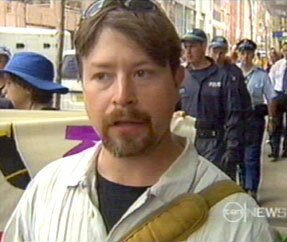 ATTORNEY-General Philip Ruddock has denied local or foreign political influence played a part in the impending deportation of American peace activist Scott Parkin. ATTORNEY-General Philip Ruddock has denied local or foreign political influence played a part in the impending deportation of American peace activist Scott Parkin.
Mr Ruddock said the 36-year-old history teacher had not been accused of a crime and his "political activities were not relevant to the decision".
"The reason he's in custody is because his visa has been cancelled. The reason his visa has been cancelled is because he's received an adverse security assessment," Mr Ruddock said on ABC radio.
"ASIO is responsible for protecting the Australian community from all forms of politically motivated violence, including violent protest activity, and they've made an assessment in relation to those matters."
Mr Ruddock said Mr Parkin had arrived in Australia on a valid visa.
"It's certainly the case that ASIO did not issue an adverse security assessment at the time of his (visa) application," Mr Ruddock said.
"The assessment has to be made upon matters relating to politically motivated violence, including violent protest activity," he said.
Mr Ruddock said ASIO had made an objective decision.
"The Australian community expects to be protected from politically motivated violence."
He denied the matter was aimed at testing the Australian public's reaction to tough anti-terror detention laws.
Mr Parkin's friend and fellow activist Ian Murray said Mr Parkin had never espoused violent political action.
"Scott believes in people power and non-violent direct action," Mr Murray said on ABC radio.
"There's a big difference between people power and non-violence and terrorism and it seems like Mr Ruddock and the agencies under his control can't seem to make that distinction."
He said the Melbourne activism workshop that Mr Parkin was about to facilitate when detained on Saturday was focused on sharing lessons from the US peace movement.
"We were going to run a four-hour workshop where Scott was going to share his experiences working with a group called Houston Global Awareness, which in its mission statement has a commitment to non-violence, to non-violent direct action," he said.
"The implication that the minister makes that Scott could somehow be involved in political violence I find highly offensive."
Federal opposition legal spokeswoman Nicola Roxon said Australians were being asked to trust Mr Ruddock's judgment.
"We are very concerned if people who are peaceful, and if this man is, if they simply are expressing views that are not in line with the Government, that is not a reason to detain and deport people."
She said Mr Parkin would have had more protection if he had been arrested, rather than being detained by the Immigration Department.
According to information on ASIO's website, "politically motivated violence" means "acts or threats of violence or unlawful harm that are intended or likely to achieve a political objective". ASIO says it is not concerned with lawful advocacy, protest or dissent.
"This Act shall not limit the right of persons to engage in lawful advocacy, protest or dissent and the exercise of that right shall not, by itself, be regarded as prejudicial to security," the website says.
The law covers acts that involve violence or are likely to lead to violence that are directed at overthrowing or destroying the Government, offences punishable under the Crimes (Foreign Incursions and Recruitment) Act 1978, the Crimes (Hijacking of Aircraft) Act 1972, the Crimes (Protection of Aircraft) Act 1973 or offences punishable under the Crimes (Internationally Protected Persons) Act 1976.
It also includes acts that threaten or endanger any person or people specified by ministerial direction.
"The intelligence that ASIO collects need only be relevant to a risk that such conduct may be engaged in, or to a reasonable apprehension that it is being or has been engaged in,'' the website says.
Meanwhile, Victorian Premier Steve Bracks said the reasons for Mr Parkin's detention should be made public.
"I think we need an explanation," Mr Bracks said.
"To not have an explanation brings into disrepute the very law which is being applied to put him into jail currently and to suspend his visa arrangements.
"Now, there might be a case there, but publicly they should have explained."
Mr Bracks said the detention of the American activist was a federal matter and the Victorian Government had been given no warning or explanation about the incident.
|